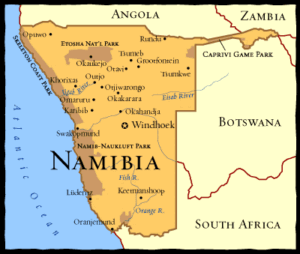By Winifred Bulus
 Namibia has embarked on the course to research and get back its artifacts from Germany.
Namibia has embarked on the course to research and get back its artifacts from Germany.
The German government has supported the course by inviting one of the workers from the Museums Association of Namibia, Jeremy Silvester from 6 to 17 of April for a visit to three German museums which keeps collection of Artifacts from Namibia.
The programme was organized by the Goethe Institute under the Visitors Programme of the German Federal Government.
Dr Silvester is the Chairperson of the Africa Accessioned Working Group that was established by the International Committee of Museums of Ethnography.
The ‘Africa Accessioned’ project was initiated by museum workers from Namibia and Zambia with the aim of obtaining information about cultural heritage objects held in European museums.
The ‘Africa Accessioned’ originated by museum workers from Namibia and zambia.
Dr Silvester was able to visit the Linden Museum in Stuttgart, the German History Museum and the collection of the German Ethnographic Museum (both in Berlin), all with the support of the German federal forigne office.
He was also able to visit the Centre for Anthropological Research on Museums and Heritage (CARMaH) at Humboldt University.
The museum visits followed a conference at the Five Continents Museum in Munich that Dr. Silvester attended and which was supported by the Volkswagen Foundation, where museum curators and academics had discussed the issue of the source and place origin of the `provenance’ research on objects collected by museums during the colonial period.
The study of provenance is about tracing the origins of an object, the way in which it was obtained and the journey it took to, eventually, end up in a museum’s collection.
Also, in 2011, Namibian tribal leaders visited Berlin to collect the skulls of 20 compatriots who died under Germany’s colonial rule in the early 1900s.